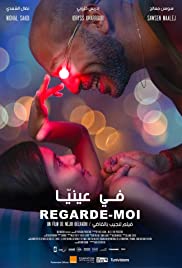
REGARDE MOI/LOOK AT ME
Tunisia, 2018, 96 minutes, Colour.
Nidhal Saadi, Aziz Jebali, Saoussen Maalej.
Directed by Nejib Belkadhi.
Over the years there have been some striking films from Tunisia. They provide an opportunity for world audiences to see something of life in that country, a Muslim country, but far less strict in its legislation than countries like Iran. It also seems to offer a great amount of freedom in terms of social behaviour, clothing, the role of women¦
This film opens in Marseilles, focusing on a Tunisian middle-aged man who has left his own country, has abandoned his wife and his severely autistic son. He has built a life in Marseilles, his shop, dealing with goods, and has a partner who is expecting a baby.
He is recalled to Tunisia to cope with the situation where his wife is in hospital in coma and he wants her to recover to divorce and settle his situation in France. He also has to deal with his sister in law who has been managing the almost unmanageable young boy. There is also pressure from his severe mother, help from his brother.
Much of the film shows the man trying to bond with his son who does not understand, is exasperated at the boy's unruly behaviour, tries to cope, buys the boy presents but finds it is almost impossible to truly communicate with him. He tries an experiment with setting up lights and blue shade in the boy's room, who is fascinated by the lights, wanting to tinker with them. At one moment, the man puts lights on his eyes and the boy touches him.
The film does not draw to a conclusion. Rather, it stops, relying on the audience's response to the man at his son and the situation to ponder on what might happen for their futures.
1. The title? From the perspective of Youssef, his autism, his behaviour, his emotional needs, attention?
2. A Tunisian film, the Marseilles settings, the waterfront, the shops, small-time crime? The settings in Tunisia, the city, homes and apartments, streets and shops, nightclubs, hospitals? The countryside, the sea? The musical score?
3. Lofti and his story? Age, experience, Tunisian, the move to Marseilles, the setting up the shops, his deals, stand over tactics, dissatisfied customers, the management of the shop? His relationship with Sophie? Pregnancy? Preparation for the birth?
4. The call from Tunisia, Lofti having to go back home? Meeting with his brother, his brother getting him up to date? Meeting his mother, her strong mindedness?
5. The situation, his marriage, his abandoning his marriage and his child, the child and autism, difficult to control? His sister in law and her looking after the boy, her understanding him? Her family? The clash with Lofti, his taking the boy?
6. The wife, in hospital, coma, her sister and family visiting her, Lofti standing outside, his wanting her to recover, to file for divorce?
7. The bulk of the film with the sequences between Lofti and his son? The age of the boy, being looked after by family, friends? His appearance, long hair? Ultra-kinetic? His mind? Attention? Movement? A strong demonstration of the perpetual energy of this kind of autistic boy? The impact on adults?
8. Lofti, wanting the best for the boy, bonding with him, yet the frequent exasperation, not understanding him, lack of empathy with his son? Buying him things? Taking him out? The behaviour in public? The behaviour at home? Lofti and his losing his temper? Going out on the town, leaving the boy with his brother, drinking, clubbing, the boy's disappearance, the role of the police?
9. Lofti installing the lights in his son's room, the boy's fascination, wanting to touch? The touching scene where Lofti puts lights on his own eyes and his son touches him?
10. Lofti, looking at the photos from the past, his camera, taking photos of the boy, the file?
11. Interactions with his sister in law, the phone calls to try to find an Institute to take the boy? The intercutting of phone calls from Marseilles, Sophie, the buying of the crib, preparations for the baby?
12. Looking at the pictures, Lofti and his sister in law, the role of the boy, in the film just stopping? Leaving it for the audience to ponder on what would happen to the characters?